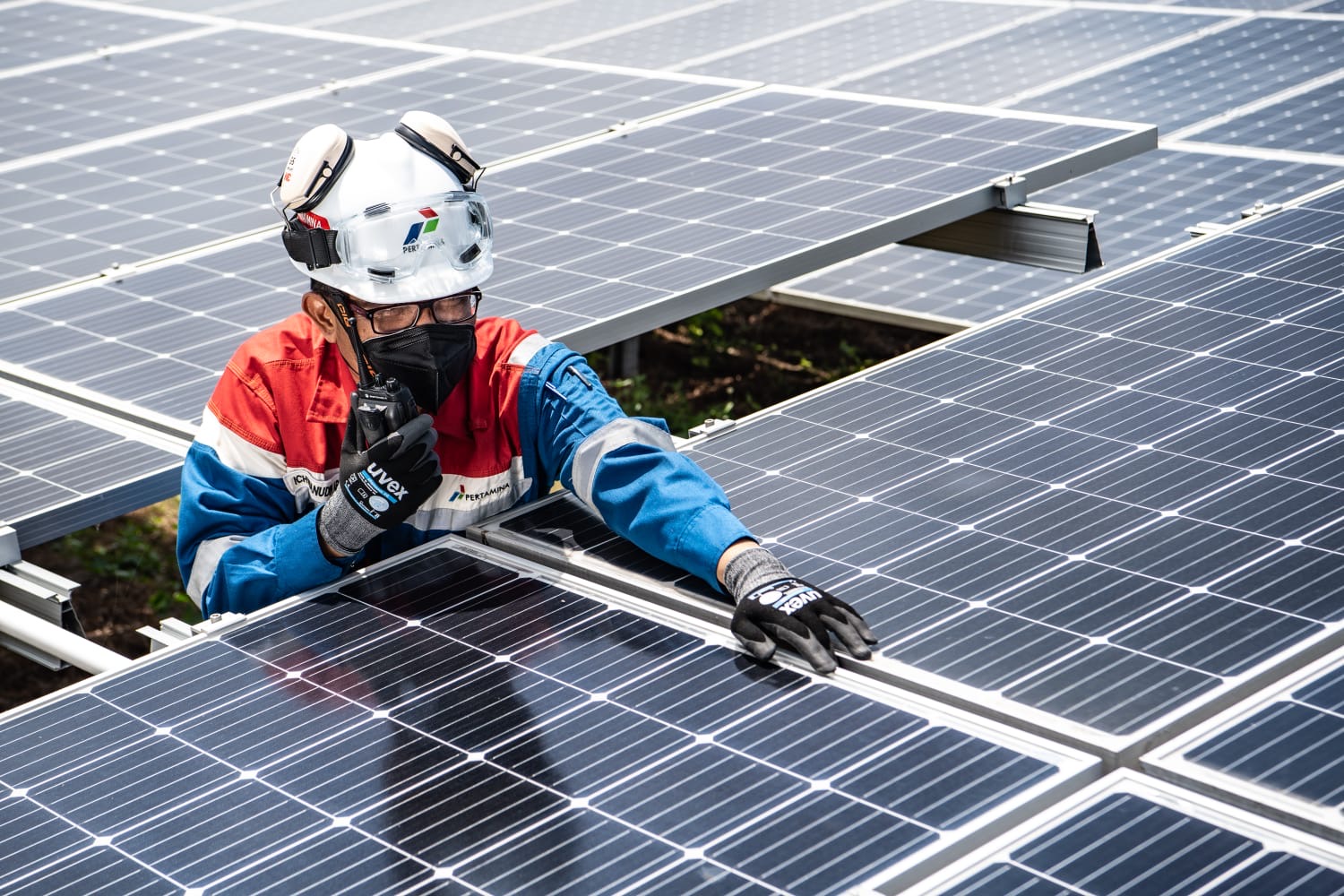
Supports the Government's Energy Transition Plan, This is Pertamina's Clean Energy Project
Jakarta, December 2, 2021 - President Joko Widodo emphasized that SOEs need to anticipate in carrying out projects and investments to welcome the energy transition era. In line with this instruction, PT Pertamina (Persero) has confirmed its steps to support the implementation of the energy transition roadmap through various programs that have been running as well as in the development of New and Renewable Energy (NRE).
For new energy, after successfully implementing B30 in 2019, Pertamina continued its positive achievements and strengthened its commitment to sustainable innovation by successfully processing 100% Refined, Bleached, and Deodorized Palm Oil (RBDPO) which produces Green Diesel (D-100) products at the Dumai Refinery and targeted to be completed in 2022. Not only that, in August 2021, Pertamina scored another new milestone in the national aviation industry through the production of 'Bioavtur J2.4', an innovation of clean energy based on biofuels (BBN) for air transportation modes. The biofuel product is inseparable from the development of the Katalis Merah Putih carried out by Pertamina's Research & Technology Innovation in collaboration with ITB.
Currently, Pertamina is executing the TDHT revamp on the Standalone Biorefinery Phase 1 project at the Cilacap Refinery. This project is targeted for completion on December 10, 2021, and will continue to phase II in 2023. With the completion of that project, the Cilacap Refinery will be able to produce Biodiesel HVO (D100) with a capacity of 3 thousand barrels per day (kbpd) from Feed Refined Bleached Deodorized Palm Oil (RBDPO). Next, Pertamina through the Plaju Refinery Standalone Biorefinery is targeted for 2024.
"All of these biofuel development projects are part of Pertamina's efforts to face the energy transition in which the impact has a potential to reduce oil imports," said Fajriyah Usman, Vice President of Corporate Communication of PT Pertamina (Persero) in Jakarta (25/11).
Furthermore, the development of the biofuel will be upgraded to Phase 2, so that in the future, the Cilacap Refinery will be able to process D100 with a capacity of 6 kbpd from multi-feeds namely RBDPO, Crude Palm Oil (CPO), or used cooking oil (UCO). The Phase 2 development is targeted to be completed in 2024.
"This 100% vegetable-sourced biodiesel is proof that Pertamina really supports the Government's program to utilize domestic energy sources and reduce dependence on imported fuel," added Fajriyah.
Other new energies that are being developed by Pertamina are Green Hydrogen and Blue Hydrogen which pilot projects will start in the operating area. For Green Hydrogen, through PT Pertamina Geothermal Energy (PGE), the company targeted to produce them from all Pertamina Geothermal Working Areas with a production of around 8,600 kg per day. The Green Hydrogen pilot project has started at the Ulubelu WK. Moreover, PT Kilang Pertamina Internasional (KPI) is also preparing a project to develop Blue Hydrogen from the water electrolysis process with a certified green electrical energy source, replacing the conventional hydrogen production process that converts natural gas. The development of Blue Hydrogen will be focused on the Plaju Refinery and the Cilacap Refinery.
"Through this project, Pertamina can reduce the carbon footprint in hydrogen production. So, with Blue Hydrogen, Pertamina's processing business line is also capable to contribute in reducing emissions during operation because the hydrogen source used is more environmentally friendly," she said.
Steps to produce new energy are also carried out in the development of Dimethyl Ether (DME) which is sourced from coal. Through the synergy of PT Bukit Asam and Air Product Chemicals, Inc (APCI), Pertamina will start running a pilot project for developing DME in Tanjung Enim.
For new energy-based power plants, Pertamina is developing a Biogas Power Plant (PLTBg) and a Biomass Power Plant (PLTBm) with a total capacity of 153 MW targeted to complete by 2026. Currently, PLTBg has been operating in the Sei Mangkei Special Economic Zone, North Sumatra. with a total capacity of 2.4 MW.
Furthermore, the development of new energy is also determined by Pertamina by developing a battery manufacturing and storage project to support the growth of the electric vehicle ecosystem in Indonesia. Through the Indonesia Battery Corporation, Pertamina and other SOEs are targeting a production of 140 GWh by 2029 which is intended for 2-wheeled and 4-wheeled vehicles.
For renewable energy projects, Pertamina continues to increase the capacity of solar power plants (PLTS). Pertamina targets by 2026, the PLTS capacity will reach around 910 Mega Watt (MW), including PLTS in the Rokan Work Area to reach 200 MW, PLTS at 5000 gas stations to reach 31 MW, PLTS Dumai Refinery with a capacity of 83 MW, and continued to other refineries, the BBM/LPG terminals, and other facilities from upstream to downstream reach more than 130 MW.
In addition, the renewable energy project that was developed first by Pertamina, namely geothermal. Through Pertamina Geothermal Energy, Pertamina has managed 14 Geothermal Working Areas with a total installed capacity of 1,877 MW consisting of 672 MW (Own Operation) and 1,205 MW (Joint Operation).
"We have a strong commitment to support the government's programs in order to realize clean energy by utilizing domestic energy sources, as well as focus on completing project after project in a sustainable manner so that we can provide sufficient energy in the future," he said.**